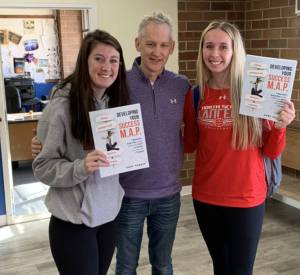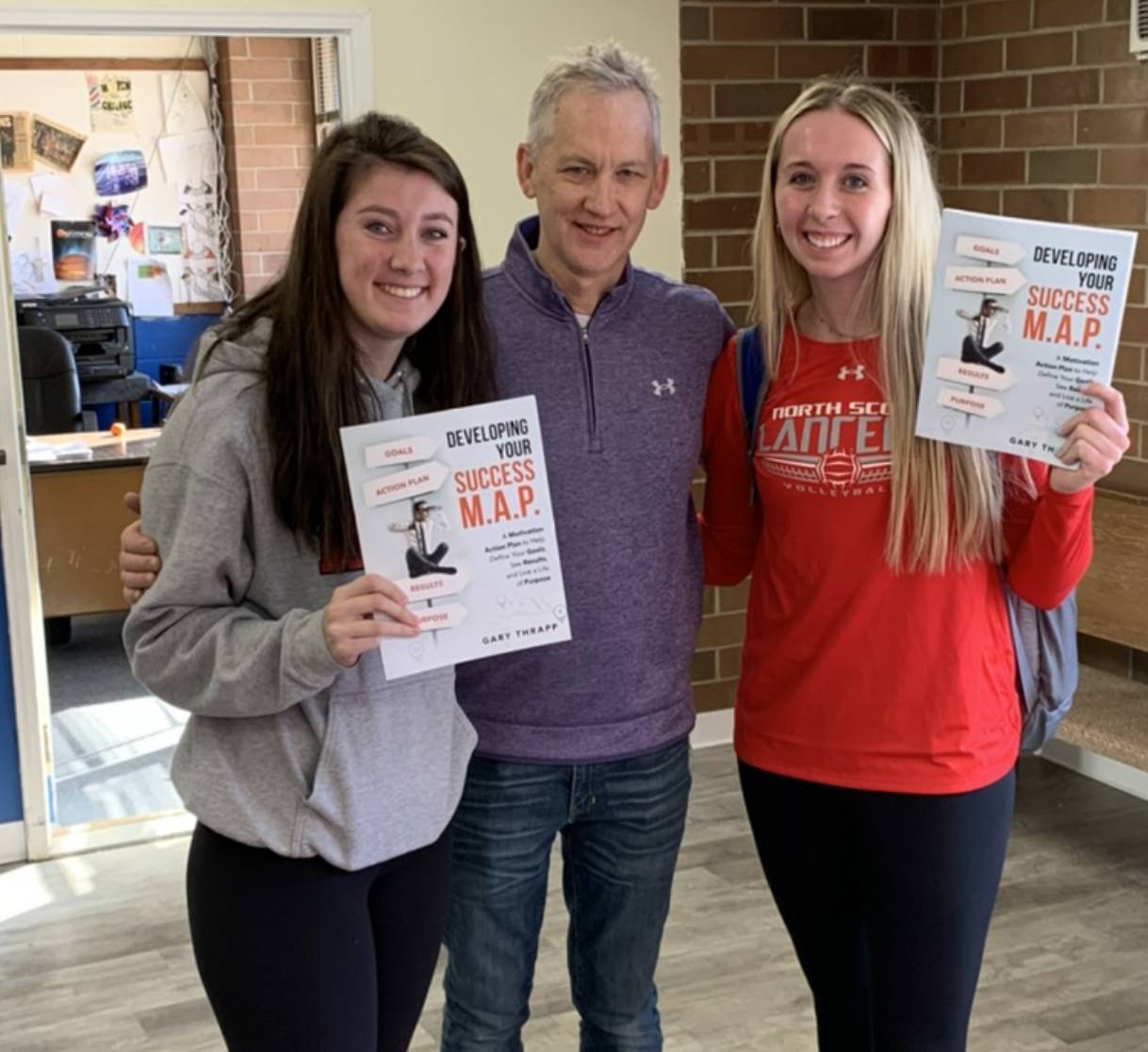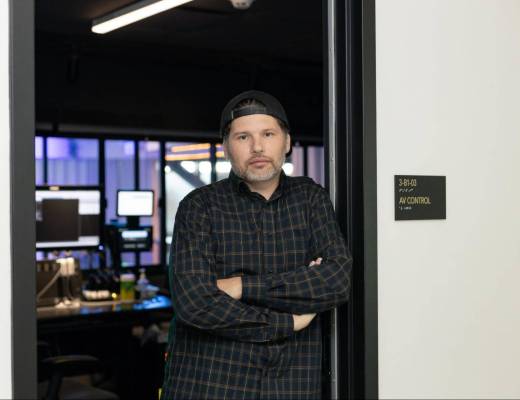 Beyond the Baseline has three layers. First is access. If a child wants to play, there is a lane. Second is development. Coaches are trained to teach structure, discipline, and leadership without losing sight of joy. Third is mentorship. Thrapp and his staff stay in the picture long after practice ends and long after scores fade. A young person who learned a crossover at twelve might be calling at twenty for help with a job lead. Thrapp treats that as part of the program rather than a happy accident.
The work extends to the adults around kids. Parents ask the same questions everywhere. Where do I go to get my child involved? How do I know if a coach is good? What if we had a bad experience last season?
Thrapp answers with tools, not platitudes. His book, “The Wild World of Youth Sports” outlines one hundred and fifty strategies for helping a child succeed in sports and in life, including checklists for spotting sound coaching, guidance on setting expectations, and a mirror for parents who demand excellence from their kids without modeling it themselves.
The link between sport and public safety is explicit. Thrapp operates a 12-step framework for violence prevention that cities and nonprofits can plug into their existing programs. The premise is plain. Idle time plus thin support equals risk. Structured time plus caring adults shifts the equation. The gym becomes a place where kids want to be. Once they are there, coaches can teach how the ball moves, how the body moves, and how a life can move toward better choices.
What sets Beyond the Baseline apart is its ground truth. Many organizations in the space emphasize high performance or credentials. Thrapp is not chasing medals or chasing a certification industry. He is building outcomes that look like adulthood. That is why his success measures do not fit neatly in a grant portal. He looks for graduates who are enrolled in college, employed, or caring for family with a sense of agency. He looks for the most practical proof of all. A former participant now runs his basketball tournaments. Another young woman confides that she is afraid to go to school because of a brewing fight, and a coach can intervene because the relationship exists. On a Facebook thread, a twenty-year-old who once struggled writes a public thank-you to Thrapp for his attention and grace, which were pivotal in rewriting his story. These are small stories that point to large effects.
This approach is harder than it sounds. Free programs make it easy to quit, and discipline is tense terrain in the current climate. Parents do not always show up, often because they are working multiple jobs and doing their best. Coaches face heat for holding standards even when those standards are the point. Thrapp does not romanticize any of it. He talks about being called names, about threats that the gym will be shut down, about the temptation to get defensive or give in. But, despite it all, Thrapp stays steady and shows up again the next night because consistency is the ethic. Consistency builds trust, and trust builds change.
The broader youth sports ecosystem rarely supports this kind of work. Costs have spiraled. Club culture prizes travel, gear, and the appearance of development over development itself. Training platforms often sell theory to adults who crave a map but never receive a compass that points to their neighborhood. Meanwhile, name-image-likeness headlines filter down to middle school. Eighth graders start to think about money before they have learned how to be coached. Thrapp is blunt about the disorientation. The answer, he says, is to rebuild from the ground and start with empathy, structure, and access.
Beyond the Baseline’s competitive edge is that it treats community as the asset, not the audience. A civic-minded parent sees that their child can play in a safe space without a budget blowout. An overwhelmed coach finds plain-spoken frameworks that show how to teach effort and set expectations. A school administrator or nonprofit leader gets a plug-and-play model that reduces idle time and improves behavior. A city official can look at Thrapp’s 12-step framework and picture a pilot that will not collapse under the weight of paperwork. The value is practical and visible.
The content engine is part of the strategy. Thrapp is expanding a library of interviews, playbooks, and coach orientations. He has started covering local varsity teams to make sure student athletes see their stories reflected back into their town. In a media landscape where local coverage keeps shrinking, this is more than goodwill. It is infrastructure for belonging. It turns a gym page into a bulletin board for the region. It tells kids who are striving that someone sees them, and it tells kids who are struggling that someone is looking for them.
Like many nonprofits, Beyond the Baseline does not sit on an endowment. Support arrives from families, friends, and civic allies who have watched the program work and want more of it. A local sporting goods store once awarded a large grant after a staff member visited the gym and saw what was happening. That story captures the texture of the operation. The work sells itself to anyone willing to stand on the sideline for half an hour and watch.
Thrapp calls his method a hybrid of lived experience and direct action. He is not interested in scoring points in the debate about what youth sports should be. He is interested in creating the conditions that let kids become themselves. That requires coaches who can teach and care at the same time, parents who are supported, not shamed, and programs that refuse to confuse cost with quality.
The bet is that when you get those basics right, everything else improves. Kids learn how to move with purpose. They learn how to lose without breaking. They learn how to show up on time even when a ride falls through and a day has gone sideways. Some will go on to win state titles – many will not – but all can leave the gym with a stronger sense of what they can control.
Beyond the Baseline does what the youth sports market often forgets to do. It meets kids where they are and gives them the structure to grow. In a sector crowded with slogans, that is the quiet advantage. In a city that needs safe places for young people to gather, that is the difference between activity and impact. Thrapp has built a model that other communities can adopt without waiting for permission.
If you lead a team, a school, a nonprofit, or a city initiative and want to see how this looks up close, visit https://beyondthebaseline.net/
Beyond the Baseline has three layers. First is access. If a child wants to play, there is a lane. Second is development. Coaches are trained to teach structure, discipline, and leadership without losing sight of joy. Third is mentorship. Thrapp and his staff stay in the picture long after practice ends and long after scores fade. A young person who learned a crossover at twelve might be calling at twenty for help with a job lead. Thrapp treats that as part of the program rather than a happy accident.
The work extends to the adults around kids. Parents ask the same questions everywhere. Where do I go to get my child involved? How do I know if a coach is good? What if we had a bad experience last season?
Thrapp answers with tools, not platitudes. His book, “The Wild World of Youth Sports” outlines one hundred and fifty strategies for helping a child succeed in sports and in life, including checklists for spotting sound coaching, guidance on setting expectations, and a mirror for parents who demand excellence from their kids without modeling it themselves.
The link between sport and public safety is explicit. Thrapp operates a 12-step framework for violence prevention that cities and nonprofits can plug into their existing programs. The premise is plain. Idle time plus thin support equals risk. Structured time plus caring adults shifts the equation. The gym becomes a place where kids want to be. Once they are there, coaches can teach how the ball moves, how the body moves, and how a life can move toward better choices.
What sets Beyond the Baseline apart is its ground truth. Many organizations in the space emphasize high performance or credentials. Thrapp is not chasing medals or chasing a certification industry. He is building outcomes that look like adulthood. That is why his success measures do not fit neatly in a grant portal. He looks for graduates who are enrolled in college, employed, or caring for family with a sense of agency. He looks for the most practical proof of all. A former participant now runs his basketball tournaments. Another young woman confides that she is afraid to go to school because of a brewing fight, and a coach can intervene because the relationship exists. On a Facebook thread, a twenty-year-old who once struggled writes a public thank-you to Thrapp for his attention and grace, which were pivotal in rewriting his story. These are small stories that point to large effects.
This approach is harder than it sounds. Free programs make it easy to quit, and discipline is tense terrain in the current climate. Parents do not always show up, often because they are working multiple jobs and doing their best. Coaches face heat for holding standards even when those standards are the point. Thrapp does not romanticize any of it. He talks about being called names, about threats that the gym will be shut down, about the temptation to get defensive or give in. But, despite it all, Thrapp stays steady and shows up again the next night because consistency is the ethic. Consistency builds trust, and trust builds change.
The broader youth sports ecosystem rarely supports this kind of work. Costs have spiraled. Club culture prizes travel, gear, and the appearance of development over development itself. Training platforms often sell theory to adults who crave a map but never receive a compass that points to their neighborhood. Meanwhile, name-image-likeness headlines filter down to middle school. Eighth graders start to think about money before they have learned how to be coached. Thrapp is blunt about the disorientation. The answer, he says, is to rebuild from the ground and start with empathy, structure, and access.
Beyond the Baseline’s competitive edge is that it treats community as the asset, not the audience. A civic-minded parent sees that their child can play in a safe space without a budget blowout. An overwhelmed coach finds plain-spoken frameworks that show how to teach effort and set expectations. A school administrator or nonprofit leader gets a plug-and-play model that reduces idle time and improves behavior. A city official can look at Thrapp’s 12-step framework and picture a pilot that will not collapse under the weight of paperwork. The value is practical and visible.
The content engine is part of the strategy. Thrapp is expanding a library of interviews, playbooks, and coach orientations. He has started covering local varsity teams to make sure student athletes see their stories reflected back into their town. In a media landscape where local coverage keeps shrinking, this is more than goodwill. It is infrastructure for belonging. It turns a gym page into a bulletin board for the region. It tells kids who are striving that someone sees them, and it tells kids who are struggling that someone is looking for them.
Like many nonprofits, Beyond the Baseline does not sit on an endowment. Support arrives from families, friends, and civic allies who have watched the program work and want more of it. A local sporting goods store once awarded a large grant after a staff member visited the gym and saw what was happening. That story captures the texture of the operation. The work sells itself to anyone willing to stand on the sideline for half an hour and watch.
Thrapp calls his method a hybrid of lived experience and direct action. He is not interested in scoring points in the debate about what youth sports should be. He is interested in creating the conditions that let kids become themselves. That requires coaches who can teach and care at the same time, parents who are supported, not shamed, and programs that refuse to confuse cost with quality.
The bet is that when you get those basics right, everything else improves. Kids learn how to move with purpose. They learn how to lose without breaking. They learn how to show up on time even when a ride falls through and a day has gone sideways. Some will go on to win state titles – many will not – but all can leave the gym with a stronger sense of what they can control.
Beyond the Baseline does what the youth sports market often forgets to do. It meets kids where they are and gives them the structure to grow. In a sector crowded with slogans, that is the quiet advantage. In a city that needs safe places for young people to gather, that is the difference between activity and impact. Thrapp has built a model that other communities can adopt without waiting for permission.
If you lead a team, a school, a nonprofit, or a city initiative and want to see how this looks up close, visit https://beyondthebaseline.net/

In Davenport, Iowa, a modest gym holds a complicated truth about American youth sports. When access is free and the adults are consistent, the court becomes more than a court. It becomes a community contract. That is the core insight behind Beyond the Baseline, the for-profit facility founded by Gary Thrapp, a forty-year veteran of youth sports who has managed more than fifty thousand games. Recognizing the deeper needs of the community, Thrapp went on to establish the Quad City Youth Sports Foundation, the nonprofit arm that oversees the free programs.
Thrapp’s mission is not theoretical. He runs free basketball and volleyball programs that welcome kids who might otherwise age out of opportunity before they ever get a fair try. Families contribute only the price of a jersey or a T-shirt so that participation still carries pride and belonging. Everything else is covered through a patchwork of for-profit revenue, local donors, and a few rare corporate grants. The model is scrappy on purpose. It puts stability where chaos usually lives.
 Beyond the Baseline has three layers. First is access. If a child wants to play, there is a lane. Second is development. Coaches are trained to teach structure, discipline, and leadership without losing sight of joy. Third is mentorship. Thrapp and his staff stay in the picture long after practice ends and long after scores fade. A young person who learned a crossover at twelve might be calling at twenty for help with a job lead. Thrapp treats that as part of the program rather than a happy accident.
The work extends to the adults around kids. Parents ask the same questions everywhere. Where do I go to get my child involved? How do I know if a coach is good? What if we had a bad experience last season?
Thrapp answers with tools, not platitudes. His book, “The Wild World of Youth Sports” outlines one hundred and fifty strategies for helping a child succeed in sports and in life, including checklists for spotting sound coaching, guidance on setting expectations, and a mirror for parents who demand excellence from their kids without modeling it themselves.
The link between sport and public safety is explicit. Thrapp operates a 12-step framework for violence prevention that cities and nonprofits can plug into their existing programs. The premise is plain. Idle time plus thin support equals risk. Structured time plus caring adults shifts the equation. The gym becomes a place where kids want to be. Once they are there, coaches can teach how the ball moves, how the body moves, and how a life can move toward better choices.
What sets Beyond the Baseline apart is its ground truth. Many organizations in the space emphasize high performance or credentials. Thrapp is not chasing medals or chasing a certification industry. He is building outcomes that look like adulthood. That is why his success measures do not fit neatly in a grant portal. He looks for graduates who are enrolled in college, employed, or caring for family with a sense of agency. He looks for the most practical proof of all. A former participant now runs his basketball tournaments. Another young woman confides that she is afraid to go to school because of a brewing fight, and a coach can intervene because the relationship exists. On a Facebook thread, a twenty-year-old who once struggled writes a public thank-you to Thrapp for his attention and grace, which were pivotal in rewriting his story. These are small stories that point to large effects.
This approach is harder than it sounds. Free programs make it easy to quit, and discipline is tense terrain in the current climate. Parents do not always show up, often because they are working multiple jobs and doing their best. Coaches face heat for holding standards even when those standards are the point. Thrapp does not romanticize any of it. He talks about being called names, about threats that the gym will be shut down, about the temptation to get defensive or give in. But, despite it all, Thrapp stays steady and shows up again the next night because consistency is the ethic. Consistency builds trust, and trust builds change.
The broader youth sports ecosystem rarely supports this kind of work. Costs have spiraled. Club culture prizes travel, gear, and the appearance of development over development itself. Training platforms often sell theory to adults who crave a map but never receive a compass that points to their neighborhood. Meanwhile, name-image-likeness headlines filter down to middle school. Eighth graders start to think about money before they have learned how to be coached. Thrapp is blunt about the disorientation. The answer, he says, is to rebuild from the ground and start with empathy, structure, and access.
Beyond the Baseline’s competitive edge is that it treats community as the asset, not the audience. A civic-minded parent sees that their child can play in a safe space without a budget blowout. An overwhelmed coach finds plain-spoken frameworks that show how to teach effort and set expectations. A school administrator or nonprofit leader gets a plug-and-play model that reduces idle time and improves behavior. A city official can look at Thrapp’s 12-step framework and picture a pilot that will not collapse under the weight of paperwork. The value is practical and visible.
The content engine is part of the strategy. Thrapp is expanding a library of interviews, playbooks, and coach orientations. He has started covering local varsity teams to make sure student athletes see their stories reflected back into their town. In a media landscape where local coverage keeps shrinking, this is more than goodwill. It is infrastructure for belonging. It turns a gym page into a bulletin board for the region. It tells kids who are striving that someone sees them, and it tells kids who are struggling that someone is looking for them.
Like many nonprofits, Beyond the Baseline does not sit on an endowment. Support arrives from families, friends, and civic allies who have watched the program work and want more of it. A local sporting goods store once awarded a large grant after a staff member visited the gym and saw what was happening. That story captures the texture of the operation. The work sells itself to anyone willing to stand on the sideline for half an hour and watch.
Thrapp calls his method a hybrid of lived experience and direct action. He is not interested in scoring points in the debate about what youth sports should be. He is interested in creating the conditions that let kids become themselves. That requires coaches who can teach and care at the same time, parents who are supported, not shamed, and programs that refuse to confuse cost with quality.
The bet is that when you get those basics right, everything else improves. Kids learn how to move with purpose. They learn how to lose without breaking. They learn how to show up on time even when a ride falls through and a day has gone sideways. Some will go on to win state titles – many will not – but all can leave the gym with a stronger sense of what they can control.
Beyond the Baseline does what the youth sports market often forgets to do. It meets kids where they are and gives them the structure to grow. In a sector crowded with slogans, that is the quiet advantage. In a city that needs safe places for young people to gather, that is the difference between activity and impact. Thrapp has built a model that other communities can adopt without waiting for permission.
If you lead a team, a school, a nonprofit, or a city initiative and want to see how this looks up close, visit https://beyondthebaseline.net/
Beyond the Baseline has three layers. First is access. If a child wants to play, there is a lane. Second is development. Coaches are trained to teach structure, discipline, and leadership without losing sight of joy. Third is mentorship. Thrapp and his staff stay in the picture long after practice ends and long after scores fade. A young person who learned a crossover at twelve might be calling at twenty for help with a job lead. Thrapp treats that as part of the program rather than a happy accident.
The work extends to the adults around kids. Parents ask the same questions everywhere. Where do I go to get my child involved? How do I know if a coach is good? What if we had a bad experience last season?
Thrapp answers with tools, not platitudes. His book, “The Wild World of Youth Sports” outlines one hundred and fifty strategies for helping a child succeed in sports and in life, including checklists for spotting sound coaching, guidance on setting expectations, and a mirror for parents who demand excellence from their kids without modeling it themselves.
The link between sport and public safety is explicit. Thrapp operates a 12-step framework for violence prevention that cities and nonprofits can plug into their existing programs. The premise is plain. Idle time plus thin support equals risk. Structured time plus caring adults shifts the equation. The gym becomes a place where kids want to be. Once they are there, coaches can teach how the ball moves, how the body moves, and how a life can move toward better choices.
What sets Beyond the Baseline apart is its ground truth. Many organizations in the space emphasize high performance or credentials. Thrapp is not chasing medals or chasing a certification industry. He is building outcomes that look like adulthood. That is why his success measures do not fit neatly in a grant portal. He looks for graduates who are enrolled in college, employed, or caring for family with a sense of agency. He looks for the most practical proof of all. A former participant now runs his basketball tournaments. Another young woman confides that she is afraid to go to school because of a brewing fight, and a coach can intervene because the relationship exists. On a Facebook thread, a twenty-year-old who once struggled writes a public thank-you to Thrapp for his attention and grace, which were pivotal in rewriting his story. These are small stories that point to large effects.
This approach is harder than it sounds. Free programs make it easy to quit, and discipline is tense terrain in the current climate. Parents do not always show up, often because they are working multiple jobs and doing their best. Coaches face heat for holding standards even when those standards are the point. Thrapp does not romanticize any of it. He talks about being called names, about threats that the gym will be shut down, about the temptation to get defensive or give in. But, despite it all, Thrapp stays steady and shows up again the next night because consistency is the ethic. Consistency builds trust, and trust builds change.
The broader youth sports ecosystem rarely supports this kind of work. Costs have spiraled. Club culture prizes travel, gear, and the appearance of development over development itself. Training platforms often sell theory to adults who crave a map but never receive a compass that points to their neighborhood. Meanwhile, name-image-likeness headlines filter down to middle school. Eighth graders start to think about money before they have learned how to be coached. Thrapp is blunt about the disorientation. The answer, he says, is to rebuild from the ground and start with empathy, structure, and access.
Beyond the Baseline’s competitive edge is that it treats community as the asset, not the audience. A civic-minded parent sees that their child can play in a safe space without a budget blowout. An overwhelmed coach finds plain-spoken frameworks that show how to teach effort and set expectations. A school administrator or nonprofit leader gets a plug-and-play model that reduces idle time and improves behavior. A city official can look at Thrapp’s 12-step framework and picture a pilot that will not collapse under the weight of paperwork. The value is practical and visible.
The content engine is part of the strategy. Thrapp is expanding a library of interviews, playbooks, and coach orientations. He has started covering local varsity teams to make sure student athletes see their stories reflected back into their town. In a media landscape where local coverage keeps shrinking, this is more than goodwill. It is infrastructure for belonging. It turns a gym page into a bulletin board for the region. It tells kids who are striving that someone sees them, and it tells kids who are struggling that someone is looking for them.
Like many nonprofits, Beyond the Baseline does not sit on an endowment. Support arrives from families, friends, and civic allies who have watched the program work and want more of it. A local sporting goods store once awarded a large grant after a staff member visited the gym and saw what was happening. That story captures the texture of the operation. The work sells itself to anyone willing to stand on the sideline for half an hour and watch.
Thrapp calls his method a hybrid of lived experience and direct action. He is not interested in scoring points in the debate about what youth sports should be. He is interested in creating the conditions that let kids become themselves. That requires coaches who can teach and care at the same time, parents who are supported, not shamed, and programs that refuse to confuse cost with quality.
The bet is that when you get those basics right, everything else improves. Kids learn how to move with purpose. They learn how to lose without breaking. They learn how to show up on time even when a ride falls through and a day has gone sideways. Some will go on to win state titles – many will not – but all can leave the gym with a stronger sense of what they can control.
Beyond the Baseline does what the youth sports market often forgets to do. It meets kids where they are and gives them the structure to grow. In a sector crowded with slogans, that is the quiet advantage. In a city that needs safe places for young people to gather, that is the difference between activity and impact. Thrapp has built a model that other communities can adopt without waiting for permission.
If you lead a team, a school, a nonprofit, or a city initiative and want to see how this looks up close, visit https://beyondthebaseline.net/
 Beyond the Baseline has three layers. First is access. If a child wants to play, there is a lane. Second is development. Coaches are trained to teach structure, discipline, and leadership without losing sight of joy. Third is mentorship. Thrapp and his staff stay in the picture long after practice ends and long after scores fade. A young person who learned a crossover at twelve might be calling at twenty for help with a job lead. Thrapp treats that as part of the program rather than a happy accident.
The work extends to the adults around kids. Parents ask the same questions everywhere. Where do I go to get my child involved? How do I know if a coach is good? What if we had a bad experience last season?
Thrapp answers with tools, not platitudes. His book, “The Wild World of Youth Sports” outlines one hundred and fifty strategies for helping a child succeed in sports and in life, including checklists for spotting sound coaching, guidance on setting expectations, and a mirror for parents who demand excellence from their kids without modeling it themselves.
The link between sport and public safety is explicit. Thrapp operates a 12-step framework for violence prevention that cities and nonprofits can plug into their existing programs. The premise is plain. Idle time plus thin support equals risk. Structured time plus caring adults shifts the equation. The gym becomes a place where kids want to be. Once they are there, coaches can teach how the ball moves, how the body moves, and how a life can move toward better choices.
What sets Beyond the Baseline apart is its ground truth. Many organizations in the space emphasize high performance or credentials. Thrapp is not chasing medals or chasing a certification industry. He is building outcomes that look like adulthood. That is why his success measures do not fit neatly in a grant portal. He looks for graduates who are enrolled in college, employed, or caring for family with a sense of agency. He looks for the most practical proof of all. A former participant now runs his basketball tournaments. Another young woman confides that she is afraid to go to school because of a brewing fight, and a coach can intervene because the relationship exists. On a Facebook thread, a twenty-year-old who once struggled writes a public thank-you to Thrapp for his attention and grace, which were pivotal in rewriting his story. These are small stories that point to large effects.
This approach is harder than it sounds. Free programs make it easy to quit, and discipline is tense terrain in the current climate. Parents do not always show up, often because they are working multiple jobs and doing their best. Coaches face heat for holding standards even when those standards are the point. Thrapp does not romanticize any of it. He talks about being called names, about threats that the gym will be shut down, about the temptation to get defensive or give in. But, despite it all, Thrapp stays steady and shows up again the next night because consistency is the ethic. Consistency builds trust, and trust builds change.
The broader youth sports ecosystem rarely supports this kind of work. Costs have spiraled. Club culture prizes travel, gear, and the appearance of development over development itself. Training platforms often sell theory to adults who crave a map but never receive a compass that points to their neighborhood. Meanwhile, name-image-likeness headlines filter down to middle school. Eighth graders start to think about money before they have learned how to be coached. Thrapp is blunt about the disorientation. The answer, he says, is to rebuild from the ground and start with empathy, structure, and access.
Beyond the Baseline’s competitive edge is that it treats community as the asset, not the audience. A civic-minded parent sees that their child can play in a safe space without a budget blowout. An overwhelmed coach finds plain-spoken frameworks that show how to teach effort and set expectations. A school administrator or nonprofit leader gets a plug-and-play model that reduces idle time and improves behavior. A city official can look at Thrapp’s 12-step framework and picture a pilot that will not collapse under the weight of paperwork. The value is practical and visible.
The content engine is part of the strategy. Thrapp is expanding a library of interviews, playbooks, and coach orientations. He has started covering local varsity teams to make sure student athletes see their stories reflected back into their town. In a media landscape where local coverage keeps shrinking, this is more than goodwill. It is infrastructure for belonging. It turns a gym page into a bulletin board for the region. It tells kids who are striving that someone sees them, and it tells kids who are struggling that someone is looking for them.
Like many nonprofits, Beyond the Baseline does not sit on an endowment. Support arrives from families, friends, and civic allies who have watched the program work and want more of it. A local sporting goods store once awarded a large grant after a staff member visited the gym and saw what was happening. That story captures the texture of the operation. The work sells itself to anyone willing to stand on the sideline for half an hour and watch.
Thrapp calls his method a hybrid of lived experience and direct action. He is not interested in scoring points in the debate about what youth sports should be. He is interested in creating the conditions that let kids become themselves. That requires coaches who can teach and care at the same time, parents who are supported, not shamed, and programs that refuse to confuse cost with quality.
The bet is that when you get those basics right, everything else improves. Kids learn how to move with purpose. They learn how to lose without breaking. They learn how to show up on time even when a ride falls through and a day has gone sideways. Some will go on to win state titles – many will not – but all can leave the gym with a stronger sense of what they can control.
Beyond the Baseline does what the youth sports market often forgets to do. It meets kids where they are and gives them the structure to grow. In a sector crowded with slogans, that is the quiet advantage. In a city that needs safe places for young people to gather, that is the difference between activity and impact. Thrapp has built a model that other communities can adopt without waiting for permission.
If you lead a team, a school, a nonprofit, or a city initiative and want to see how this looks up close, visit https://beyondthebaseline.net/
Beyond the Baseline has three layers. First is access. If a child wants to play, there is a lane. Second is development. Coaches are trained to teach structure, discipline, and leadership without losing sight of joy. Third is mentorship. Thrapp and his staff stay in the picture long after practice ends and long after scores fade. A young person who learned a crossover at twelve might be calling at twenty for help with a job lead. Thrapp treats that as part of the program rather than a happy accident.
The work extends to the adults around kids. Parents ask the same questions everywhere. Where do I go to get my child involved? How do I know if a coach is good? What if we had a bad experience last season?
Thrapp answers with tools, not platitudes. His book, “The Wild World of Youth Sports” outlines one hundred and fifty strategies for helping a child succeed in sports and in life, including checklists for spotting sound coaching, guidance on setting expectations, and a mirror for parents who demand excellence from their kids without modeling it themselves.
The link between sport and public safety is explicit. Thrapp operates a 12-step framework for violence prevention that cities and nonprofits can plug into their existing programs. The premise is plain. Idle time plus thin support equals risk. Structured time plus caring adults shifts the equation. The gym becomes a place where kids want to be. Once they are there, coaches can teach how the ball moves, how the body moves, and how a life can move toward better choices.
What sets Beyond the Baseline apart is its ground truth. Many organizations in the space emphasize high performance or credentials. Thrapp is not chasing medals or chasing a certification industry. He is building outcomes that look like adulthood. That is why his success measures do not fit neatly in a grant portal. He looks for graduates who are enrolled in college, employed, or caring for family with a sense of agency. He looks for the most practical proof of all. A former participant now runs his basketball tournaments. Another young woman confides that she is afraid to go to school because of a brewing fight, and a coach can intervene because the relationship exists. On a Facebook thread, a twenty-year-old who once struggled writes a public thank-you to Thrapp for his attention and grace, which were pivotal in rewriting his story. These are small stories that point to large effects.
This approach is harder than it sounds. Free programs make it easy to quit, and discipline is tense terrain in the current climate. Parents do not always show up, often because they are working multiple jobs and doing their best. Coaches face heat for holding standards even when those standards are the point. Thrapp does not romanticize any of it. He talks about being called names, about threats that the gym will be shut down, about the temptation to get defensive or give in. But, despite it all, Thrapp stays steady and shows up again the next night because consistency is the ethic. Consistency builds trust, and trust builds change.
The broader youth sports ecosystem rarely supports this kind of work. Costs have spiraled. Club culture prizes travel, gear, and the appearance of development over development itself. Training platforms often sell theory to adults who crave a map but never receive a compass that points to their neighborhood. Meanwhile, name-image-likeness headlines filter down to middle school. Eighth graders start to think about money before they have learned how to be coached. Thrapp is blunt about the disorientation. The answer, he says, is to rebuild from the ground and start with empathy, structure, and access.
Beyond the Baseline’s competitive edge is that it treats community as the asset, not the audience. A civic-minded parent sees that their child can play in a safe space without a budget blowout. An overwhelmed coach finds plain-spoken frameworks that show how to teach effort and set expectations. A school administrator or nonprofit leader gets a plug-and-play model that reduces idle time and improves behavior. A city official can look at Thrapp’s 12-step framework and picture a pilot that will not collapse under the weight of paperwork. The value is practical and visible.
The content engine is part of the strategy. Thrapp is expanding a library of interviews, playbooks, and coach orientations. He has started covering local varsity teams to make sure student athletes see their stories reflected back into their town. In a media landscape where local coverage keeps shrinking, this is more than goodwill. It is infrastructure for belonging. It turns a gym page into a bulletin board for the region. It tells kids who are striving that someone sees them, and it tells kids who are struggling that someone is looking for them.
Like many nonprofits, Beyond the Baseline does not sit on an endowment. Support arrives from families, friends, and civic allies who have watched the program work and want more of it. A local sporting goods store once awarded a large grant after a staff member visited the gym and saw what was happening. That story captures the texture of the operation. The work sells itself to anyone willing to stand on the sideline for half an hour and watch.
Thrapp calls his method a hybrid of lived experience and direct action. He is not interested in scoring points in the debate about what youth sports should be. He is interested in creating the conditions that let kids become themselves. That requires coaches who can teach and care at the same time, parents who are supported, not shamed, and programs that refuse to confuse cost with quality.
The bet is that when you get those basics right, everything else improves. Kids learn how to move with purpose. They learn how to lose without breaking. They learn how to show up on time even when a ride falls through and a day has gone sideways. Some will go on to win state titles – many will not – but all can leave the gym with a stronger sense of what they can control.
Beyond the Baseline does what the youth sports market often forgets to do. It meets kids where they are and gives them the structure to grow. In a sector crowded with slogans, that is the quiet advantage. In a city that needs safe places for young people to gather, that is the difference between activity and impact. Thrapp has built a model that other communities can adopt without waiting for permission.
If you lead a team, a school, a nonprofit, or a city initiative and want to see how this looks up close, visit https://beyondthebaseline.net/
Next Post






